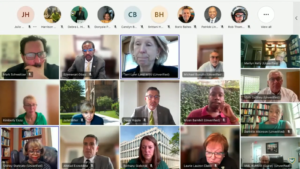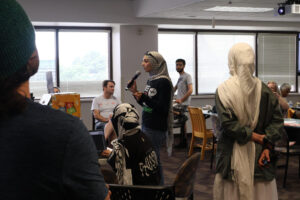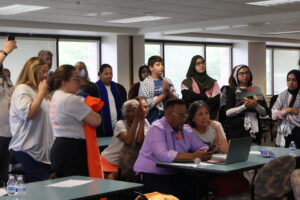Members of the Wayne State University community have been advocating for the university to divest from companies with ties to Israel since November.
WSU’s Board of Governors met virtually in its first meeting since the removal of the pro-Palestine campus encampment and discussed what the investment process looks like. It also hosted an hour and a half of public comment almost entirely related to concerns about the university administration’s response to pro-Palestine protests as well as bargaining demands from the Wayne Academic Union (WAU) of 1,700 university faculty and staff.
BOG meetings ordinarily happen in-person, but the board moved the meeting to virtual. It also moved public comment, which normally tops the meeting agenda, to the end of the session after all votes and discussion had taken place.
“Meeting formats and locations are determined at the discretion of the BOG,” Associate Director of Communications Bill Roose said in an email on Monday. “Public comment timing on the agenda varies at the board’s discretion. The meeting will feature two educational investment presentations; holding public comment at the end of the meeting will give individuals submitting public comment an opportunity to learn more about the university’s investments prior to addressing the board.”
Members of WSU’s Students for Justice in Palestine and affiliated alumni, faculty and staff and Wayne Law groups as well as WAU members, who are currently negotiating a new contract, met in WSU’s Undergraduate Library to stream the meeting and give their public comments in an in-person setting they called “The People’s BOG.”
“They moved it (the meeting) virtually as a defensive move so they would be able to get their word out without having any face-to-face interactions with the people they are elected to serve,” Ridaa Khan, a WSU student senator and pro-Palestinian activist, told the Detroit Metro Times. “Many of the students, staff and faculty are upset and want this opportunity to address the board. A campus is supposed to promote free speech. This is setting a dangerous precedent. The genocide is continuing, and we are not being heard.”
Bethany Gielczyk, chief financial officer and senior vice president for finance and business operations, gave a presentation on how investiture works at WSU. There are two different WSU-related investments: A cash pool of the university’s day-to-day money and a donor endowment investment for specific donor purposes through the Wayne State Foundation, a non-profit group outside of the university that collaborates with it.
The investment portfolio for both the university cash pool and the Wayne State Foundation includes between 1.25 percent and 1.5 percent exposure to companies manufacturing controversial weapons out of the total larger funds, and to reduce this exposure it would be necessary to divest from 80 percent of the current investments, Gielczyk said.
“We have no direct holdings in individual companies through stocks or bonds in the cash pool at all,” Gielczyk said. “Nobody at the university or foundation does day-to-day management or chooses the individual funds or managers that are invested with the pool.”
Multiple students, alumni, faculty and staff out of the 26 total signed up for public comment spoke out against the treatment of pro-Palestinian protesters and the university not meeting with or listening to students.

The Wayne State Board of Governors met virtually on June 26 in its first meeting since the removal of the pro-Palestine encampment on WSU’s campus. – Screenshot
Khan said during public comment the administration has been diminishing pro-Palestine viewpoints.
“I’ve been called a student leader by administration, but when I try and fulfill that role and bring up concerns that make the administration uncomfortable by questioning their pocket, I am told my voice is one out of a diverse array of students,” Khan said. “There are thousands of students, faculty and community members who want divestment, and you know this well. The Board and president have been doing a great job catering to the pro-genocide and anti-student minority.”
School of Medicine alumnus Dr. Umair Daimee said it was “beautiful to see a diverse group of students, alumni and community members that included rabbis and Nakba survivors” meet together on campus and criticized the Board for its violent dismantling of the protest.
“You threw the riot police at them, a diverse group of peaceful protesters that were supported by the Muslim Student Association, Black Student Union and the Department of African American Studies in a predominantly African American city,” Daimee said.
Kess Ballentine, WAU vice president and faculty at the School of Social Work, said she “actively trains students to understand and disrupt forces of oppression for collective action and brave participation in democracy” during her courses on social justice, American social policy and policy advocacy.
“I am calling in (to the meeting) from the People’s BOG, where we are not afraid to meet together as a community,” Ballentine said. “The objectives of the labor movement and every other liberation movement in history are shared… We seek to ensure all of us share the prosperity we collectively create to be safe from violence, to be respected and valued and to be heard… I ask that the administration and members of this Board evaluate how well your budgetary choices reflect your commitment to DEI and really consider how the greater investment in members and our students can make WSU not only a better place to work and learn, but a better example of democratic processes in higher education.”
Multiple members of the WAU gave public comments, asking for reconsideration of the newly approved budget to ensure faculty and staff raises, emergency housing funds for students and more.
Technical difficulties moved the order of public comment around, with one registered commenter unable to give comment through audio at all. The order skipped and came back to student Mahmoud Muheisen because attendees could not hear his audio the first time.
“I find it odd that in the midst of everything happening with some new stuff we found out now with the unions and the encampment, you guys decide now to test new technology (and make the meeting virtual),” Muheisen said. “That’s laughable. Did you guys not test it? Why were there so many difficulties? You guys had the whole COVID crisis to test this kind of stuff and then there were still problems.”
Student Nuzmeya Abdrabboh was one of many who encouraged the Board to reconsider its investments.
“You think that you’re claiming neutrality, but you’re not claiming neutrality,” Abdrabboh said. “You’re actively choosing to invest in one side, you have money that you’re investing in war profits or companies, and we do not support that.”
Pro-Palestine commenters also asked for the Board to call for an extraordinary session to discuss divestment.

WSU student activist Nuzmeya Abdrabboh addresses the BOG through Teams at The People’s BOG meeting.
Governor Bryan Barnhill broke the silence from the BOG and asked the community to think critically about the situation.
“You can’t be a person with a pulse to not have a heart for the devastation that has happened in Gaza,” Barnhill said. “In this university, we want to create opportunities to support and enhance your ability to think critically and affect change in meaningful ways. And thinking critically at times causes us to address complex issues head on and at times. Complexity demands that you have to confront multiple perspectives and even inconvenient truths.”
He said society would benefit from not demonizing people because they have a point of view.
“On a critical thinking front, I just want you all to take the time to reflect on who’s on the board. Many of my colleagues on the board are folks who have devoted their lives, their time, energy, money toward a variety of progressive causes. I don’t want to paint a broad brush because we are a board of folks who have different perspectives, but for those who wouldn’t identify as progressive people, they are respected members of our community and devoted public servants. If you put your critical thinking hat on, I want to just challenge the notion that these people, including myself, would suddenly become war warmongering sponsors of state violence.

Attendees at The People’s BOG gather around Randon Jenkins, a practicing nurse practitioner, College of Nursing clinical instructor and WAU council member, during his virtual public comment to the BOG.
“In the vein of critical thinking, but also in the vein of preparing our students to understand what it takes to truly create change,” Barnhill said, “I simply don’t think that divesting from Lockheed Martin or Boeing will accomplish the goal of creating peace in Gaza, and I don’t want to give the students the impression that that is going to be it.
“I simply don’t think that divesting from Lockheed Martin or Boeing will accomplish the goal of creating peace in Gaza, and I don’t want to give the students the impression that that is going to be it.
“I want you to have the level of critical thinking and the wherewithal to understand that in order to address complex issues, you have to do more than yell at people who ultimately would pass a policy that is tantamount to just the gesture.”
The university most recently divested from the tobacco industry in 1991.
“The impact of the Board’s policy, which I would have disagreed with back then, to divest from the tobacco industry has not eliminated the tobacco industry,” Barnhill said. “I would argue that the work that this university does in public health research does far more in the vein of improving the outcomes of people in this world. And if we want to devote ourselves to achieving peace, we’ve got to embrace the reality that it’s going to require much more hard work, much more of a discipline focus than telling folks that they have blood on their hands, simply because they disagree that divesting from some companies who may make weapons that may or may not be used in this conflict is going to resolve the issue.
“I would just encourage you to think about the fact that if you have a savings account, if you have a 401K, if you have a pension, then chances are, you know, by that logic (of divestment), you are complicit in the devastation that’s going on,” Barnhill said. “And we know that’s not the case… I just want the students to really think about and reflect on the fact that in these positions, our people, we come from the same communities, we go to the same stores, chances are we probably don’t have terribly different perspectives on the world. Now, what’s the difference between us at this moment? We have a responsibility for this university that we took an oath to uphold.”
In the same meeting, the BOG voted to increase undergraduate and graduate level tuition and fees by 4.5 percent. This increase excludes the already set School of Medicine M.D. program. The BOG also approved the Fiscal Year 2025 General Fund and Auxiliary Budget, and $21 million in campus maintenance and modernizations..
According to the BOG’s website, it will hold its next meeting on Sept.13 at the WSU Student Center.






Leave a Reply